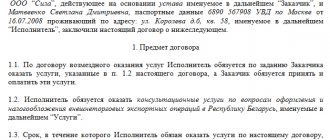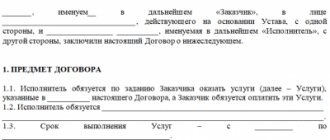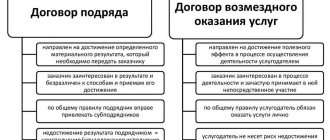What is a contract
A work contract is one of the forms of contractual relations in which one party undertakes to perform some work, and the second – to accept and pay for it.
Legislative norms regarding contracts and contracts are set out in the Civil Code, Chapter 37 §1-§5
.
The general characteristics of the contract are as follows:
- two-sidedness;
- remuneration (i.e. remuneration) of the work performed.
The contract is concluded in simple written form and does not require notarization or state registration.
Difference from an employment contract
Often they try to replace an employment contract and a remunerative agreement for the provision of services with a work contract. There are certain differences between these civil agreements.
The differences from the employment contract are presented below:
| Parameter | Employment contract | Work agreement |
| Target | Perform certain duties during the entire period of the contract | Performing a specific amount of responsibilities for a specific period of time |
| Payment | 2 times a month, strictly regulated | Upon completion of the entire scope of work or each stage |
| Subordination | Internal regulations and other local regulations at the enterprise | Independently selects a work plan and schedule for their implementation |
| Availability of legislative guarantees | Yes – vacation, sick leave, downtime | No |
| Right to results | Owned by the employer | Until it is transferred to the customer for a set amount, it belongs to the contractor |
| Risks | At the employer | On the performer |
There is a fine for “disguising” yourself as an employment contract.
Household contract
This agreement is aimed at fulfilling any needs of citizens and therefore, in content, is as close as possible to a service agreement.
Sometimes they try to replace this agreement with a contract of employment when applying for a job or the already mentioned contract for the provision of services, but this is unacceptable
The customer here can be either an individual or a legal entity.
The contractor is only the person who carries out business activities for this type of work.
What must be specified in the contract
- Full name of the customer and full name of the contractor (name of the company and the person signing the contract on behalf of the company).
- The subject of the contract is the result of the work that the customer receives as a result;
- The cost of order execution is the price written in the contract and cannot be higher than that established or regulated by government agencies.
- If the customer tries to introduce conditions for a higher cost into the document, they will be of little significance ( Article 735 of the Civil Code of the Russian Federation
). - Deadlines for the execution of work - it is necessary to indicate the beginning and end of work under the contract (otherwise the paper may be declared invalid (Art. 708 clause 1 of the Civil Code of the Russian Federation
)).Deadlines must be agreed before signing the paper or at the time of designing the task, but they can be changed in the following cases:
- significant violation of the terms of the contract by one of the parties to the contract ( Article 450 of the Civil Code of the Russian Federation
); - the customer may request that work be completed ahead of schedule during the reorganization of the contractor ( Article 60 of the Civil Code of the Russian Federation
).
significant change in circumstances ( Article 451 of the Civil Code of the Russian Federation
);
Agreement annexes
- Technical task;
- calendar plan;
- equipment list;
- list of materials;
- estimate.
Documents attached to the contract
- Documentation acceptance and transfer certificate;
- equipment acceptance certificate;
- protocol of disagreements;
- additional agreement;
- Protocol for reconciliation of disagreements.
Deadlines for filing claims under the contract
If deficiencies are discovered, claims can be made against the contractor:
- for real estate – for 5 years;
- for services – for 2 years.
Essential terms of the agreement
Subject of the agreement
At this point, you must not just write “repair and decoration of the balcony,” for example.
You need to carefully describe point by point what you want to see, right down to the hidden screw heads.
The more specificity is indicated in the “essential terms” clause in a household contract, the less likely it is that the contractor will try to leave something out by making the excuse that it is not in the contract.
Terms of work
Here it is necessary to indicate not just the beginning and end of the work being carried out.
At this point, just like in the past, it is necessary to very carefully write down all the work in stages: the beginning and end of each stage of work, which must be done within the specified time.
Payment
Payment can be made in advance and upon completion of the work, but it is better to tie the payment to the staged deadlines, then in the event of termination of the contract you will not have to sue for the money overpaid for defects.
Responsibility of the parties
In this paragraph you must write:
- that deviation from the work schedule may cause termination of the contract;
- what consequences may result from misrepresentation of information by the contractor.
Peculiarities of performing work under a contract between individuals under the Civil Code of the Russian Federation
Individuals can act as both customers and contractors in a contract agreement. At the same time, a citizen who is not registered as an individual entrepreneur can undertake paid work under a contract only if such activity is one-time. If contract work is carried out systematically by him, then he needs to obtain the status of an individual entrepreneur - otherwise he may be brought to administrative liability in the form of a fine of up to 2 thousand rubles. (Article 14.1 of the Code of Administrative Offenses of the Russian Federation).
A contract between individuals is governed by the same rules of law as an agreement involving organizations. In particular, the agreement between citizens must contain conditions on the essence of the contract work, the result to be achieved, and the timing of the work. Other conditions may be included in the text of the agreement at the discretion of the parties.
If the cost of the work does not exceed 10 thousand rubles, the contract for the performance of work between individuals may be concluded orally.
Construction contract
This agreement is concluded when working with real estate for:
- construction,
- reconstruction,
- major repairs,
- installation and commissioning works.
According to this agreement, the contractor must perform construction (or other related to real estate) work, and the customer must create conditions for the contractor to carry out these works ( clause 1 of Article 740
).
The contractor can be selected based on the results of bidding for the execution of the contractual task.
The customer can be either an individual or a legal entity.
The contractor is a licensed legal entity.
What must be specified in a construction contract
- Full name and passport details of the customer - an individual (or the name of the company and full details of the customer - a legal entity) and the name of the company and full details of the contractor - a legal entity.
- Subject of the agreement. This indicates the type of work carried out by the contractor and the materials he uses (including their compliance with environmental standards).
- Turnaround time. The beginning and end of the work being carried out must be indicated here, otherwise the contract is considered invalid.
- Payment and payment methods. It is better to write down the cost of each job point by point, indicating the total amount, and the costs according to the estimate.
- Responsibility of the parties (conditions on the basis of which the contract is subject to termination).
- Settlement of disputes.
- Date of.
- Signatures of the parties (stamps, if available).
Agreement annexes
- terms of reference;
- work schedule;
- equipment list;
- list of materials;
- estimate;
- list of technical documentation;
- permission (license) of the customer to carry out work;
- title documents for land;
- permission (license) of the contractor to carry out work;
- work procedure.
Documents attached to the contract
- equipment acceptance certificate;
- act of acceptance and transfer of technical documentation;
- certificate of acceptance of completed work ( form KS-2
); - certificate of cost of work ( form KS-3
); - additional agreement;
- protocol of disagreements;
- Protocol for reconciliation of disagreements.
Nuances of the agreement
For the most part, the nuances of writing out the clauses of this agreement are the same as in a household contract, but there are also some peculiarities:
- Subject of work - if instead of specifically described actions and scope of work it is simply written “garage construction”, then the tax office will not accept such an agreement.
- Timing of the work - a very precise indication of the beginning and end of the work being carried out is necessary (otherwise the tax office will reclassify the contract from a contract to an employment contract, and the contractor will pay income tax).
- The contract price is formed on the basis of the estimate. There should be no discrepancies in the amount of the estimate and the contract.
- The quality of the work carried out - the work must comply with the standards set out in SNIPs
.
Deadlines for filing claims
Within five years from the date of acceptance of the object by the customer.
What kind of agreement is this
A contract agreement is a documented agreement between the customer and the contractor (performer), concluded to perform certain works necessary to meet the customer’s needs (Article 702 of the Civil Code of the Russian Federation).
According to civil law, the result of such actions must be transferred by the contractor to the customer in material (materialized) form. Lawyers define direct contracting as the paid performance of work or services in favor of the customer. The result of this activity is a material object. The difference between such a contract and an employment agreement is the fact that the work contract is concluded for the purpose of implementing specific works or services and does not provide the contractor with the opportunity to receive social benefits.
Parties can be both individuals and organizations. The following types of such contracts are distinguished:
- household contract;
- building;
- to carry out design and survey work;
- for state and municipal needs;
- performing R&D and technological work;
- frame
Framework agreement is an agreement that is concluded for a long period and involves the contractor performing several types of activities, as well as the possibility of changing production volumes.
A work contract, an example of which you can download below, is a type of civil contractual relationship. The procedure for its preparation is regulated in accordance with the current civil legislation (Articles 158-161 of the Civil Code of the Russian Federation) and Federal Law-294 “On the Protection of Consumer Rights”. If we are talking about a construction contract, then, in addition to the above regulations, its development is regulated by the Town Planning Code, Federal Law-169 “On Architectural Activities”, GOST and other legislative norms. In order to draw up an up-to-date and correct sample work contract in accordance with the specific needs of the organization, the customer can take advantage of legal advice or the assistance of other experts.
Next, we will present a sample contract for the performance of work with a legal entity in 2021.
Contract agreement for design and survey work
This agreement is aimed at the contractor carrying out work on drawing up technical documentation or carrying out any survey (research) work.
In case of fulfillment of contractual obligations, the customer must pay them.
The contract is concluded with one design organization, which in the future can enter into subcontract agreements for certain types of work with smaller organizations.
This agreement can be concluded either in the usual manner or based on the results of the auction.
The customer can be both an individual and a legal entity.
The contractor is only a legal entity that has a license to carry out the requested work.
You will probably be interested in looking at the mental map “Contract (work performance)”, which specifies what the contractor is obliged to warn the customer about
Or HERE you will find out what the consequences of violating social norms are
What types of employment agreements are there:
What must be specified in the design and survey contract
For this form of contract, the law does not establish a clear design, but in general it is necessary to include in it the points inherent in all construction contracts:
- Name and full details of the contractor's and customer's organizations.
- The subject of the contract is the name and specifics of the work performed, its volume. At this point, you must specifically specify all the details of the order.
- Payment for work - payment terms, amount of remuneration (price is determined according to the estimate). If the cost is not determined by the terms of the contract, then the work performed is paid in accordance with similar services or work ( Article 424, paragraph 3 of the Civil Code of the Russian Federation
). - Timing of work - here, in addition to the beginning and end of the order, you can specify fractional execution with a report for each completed stage.
- Responsibility of the parties.
- Settlement of disputes.
- Date of.
- Signatures and seals of the parties.
Attachments to the contract
- terms of reference;
- work schedule;
- permission (license) of the customer to carry out work;
- estimate;
- permission (license) of the contractor to carry out work.
Documents attached to the contract
- Certificate of cost of work and expenses ( form KS-3
); - act of acceptance of completed work ( form KS-2
); - protocol of disagreements;
- additional agreement;
- Protocol for reconciliation of disagreements.
Deadlines for filing claims under the contract
For two years for services rendered.
The essential points of the contract are
- The subject of the contract, in which it is necessary to describe not only the details of the order, but also the quality of the result obtained.
- Responsibility of the parties - here, among other things, it is necessary to indicate: full compliance of the completed task with all points of the technical order;
- prohibition on using data for purposes other than those specified in this agreement;
- prohibition on transferring any data provided by the customer or conclusions on the work performed to third parties without the consent of the customer;
- conditions for termination of the contract (systematic violation of the terms of the document by any party, bankruptcy of the customer carried out according to a regulated procedure).
We involve subcontractors
According to current legislation, contractors have the opportunity to perform work either independently or with the involvement of other participants - subcontractors. In this case, the contractor acts as a general contractor, and the subcontractor is a company that is engaged by the general contractor under a subcontract agreement in order to perform a certain part of the work from the contract agreement (Clause 1, Article 706 of the Civil Code of the Russian Federation).
A subcontract is understood as a DP, to which both the general norms of civil legislation and the provisions of the Civil Code of the Russian Federation on contract work are applied (par. 1 of Chapter 37 of the Civil Code of the Russian Federation).
Subcontracting agreements are concluded mainly for the following activities:
- construction;
- design and survey work;
- services for government needs.
In this case, the general contractor has the right to attract several subcontractors and enter into subcontracting agreements with them. This practice is often used on large construction projects (Article 707 of the Civil Code of the Russian Federation).
Also, the law does not prohibit the signing of a new subcontract agreement with a double subcontract on behalf of the main subcontractor.
All terms of the subcontract agreement must strictly comply with the provisions of the original contract agreement for the purpose of which the subcontract is created. First of all, the subject of the contract and the deadline for its implementation must be respected. To do this, you can use combined construction schedules, which are agreed upon between all subcontractors.
Also, when engaging subcontractors, the following requirements must be met:
- The general contractor is fully responsible to the customer organization for all losses resulting from the involvement of subcontractors.
- The general contractor is responsible to the customer for violation of the subcontractor's obligations under the contract.
- The general contractor is liable to the subcontractor for the customer's violation of its obligations.
- If necessary, the customer organization has the right to attract third-party participants independently, stipulating the conditions for mutual responsibility. However, the customer can carry out such actions only after agreement with the general contractor.
- The general contractor, being an intermediary between the customer and the subcontractor, is always legally and financially responsible to one participant for violation of contractual obligations by another participant (Article 706 of the Civil Code of the Russian Federation).









